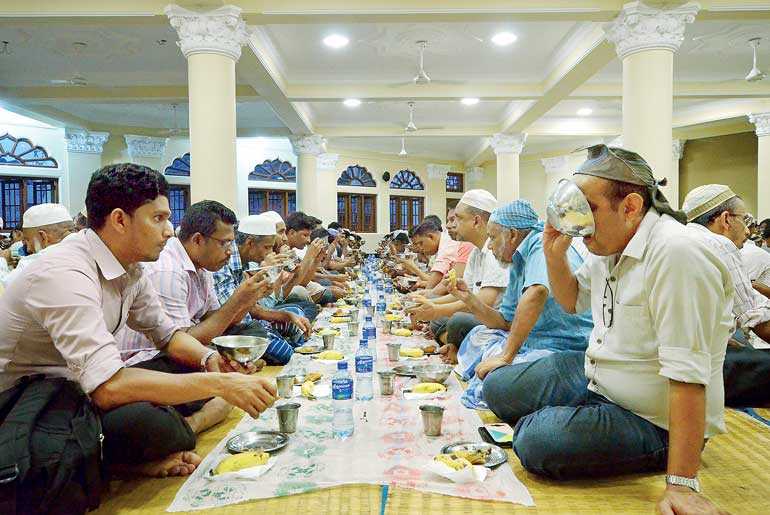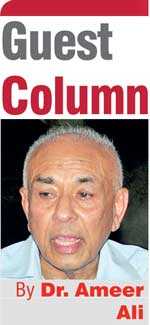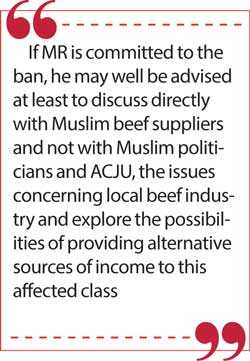Monday Feb 23, 2026
Monday Feb 23, 2026
Tuesday, 22 September 2020 02:56 - - {{hitsCtrl.values.hits}}

In spite of MR’s denial there is no doubt that the ban will affect the Muslim community directly. Majority of the country’s beef eaters and beef suppliers are Muslims, and thousands will be thrown out of employment when the ban comes into effect – Pic by Shehan Gunasekara
Prime Minister MR’s announcement to ban cow slaughter is yet another measure to please Sinhala Buddhist hardliners who were the backbone of his party’s victory at the last General Election. They were also responsible for President GR’s win in his race for presidency. 
If the proposed constitutional changes were to go through the parliament unchallenged, they will make vegetarian GR local Fuhrer (the original Fuhrer in Germany was also a vegetarian), parliament reduced to a ‘post office’ and Prime Minister to a ‘peon’, while at the same time ensuring the Rajapaksa dynasty prolonged hold on Sri Lanka’s heirloom. One of the foundations on which Rajapaksa regime will build its power house is Buddhism, and that too of the hardline variety championed by a politicised hierocracy that is bent on establishing a Theravada Buddhist state, governed by the dictum, one-country-one-law (OCOL). They are not satisfied with the current constitution’s provision for the ‘foremost place’ to Buddhism, and they want to go beyond that by using OCOL as the weapon.
MR’s announcement to ban cow slaughter to satisfy the hardliners is the first political expression of OCOL. This decision is far from a total commitment to Lord Buddha’s teaching, not to kill. It was only a few years ago in 2013, that one of these hardline monks, Bowatte Indraratana, self-immolated in front of Dalada Maligawa to advance the cause of cows. This unfortunate priest, like Prime Minister MR, has narrowed the implementation of Lord Buddha’s teaching to just one group of animals. What about the others including birds? 
However, this is not to ignore or excuse the horror afflicted upon this poor animal by greedy and cruel slaughterers. If anyone watches the way these animals are dragged and tortured on the way to abattoirs (I would urge beef eaters to watch a documentary produced for the Four Corners program in Australian ABC television) one would just give up eating beef even without a law preventing that habit. Even if the ban is withdrawn, this industry requires serious and far reaching reforms to regain an element of respectability from the wider community.
Apart from the economics of Sri Lanka’s beef industry, about which several writers have commented and warned of losses to cattle breeders, excess burden on grazing lands and pasture, and overall damage to national economy, I am focusing on the political implications of this decision, both locally as well as regionally. Locally, in spite of MR’s denial there is no doubt that the ban will affect the Muslim community directly. Majority of the country’s beef eaters and beef suppliers are Muslims, and thousands will be thrown out of employment when the ban comes into effect.
Already, this community is traumatised through repeated shocks of violence, especially after 2009. A mélange of extremist elements of which one or two have external links, encouraged by a bunch supremacist Buddhist monks, funded by a jealous Sinhala-Buddhist business class, popularised by sections of the media and tolerated by law enforcers with vested interest, rampaged through towns and bazaars looting Muslim commercial establishments, burning and vandalising Muslim properties, causing physical injuries and even deaths. The fact that an ineffective and selfish Muslim leadership stood aside without knowing what to do stunned the community at large. 
However, after the Easter bombing incident of April 2019 anti-Muslim feelings reached fever pitch, and sadly, law enforcement agencies intervened only minimally at best to stop the mayhem. It is in such a climate of shock and horror that MR’s announcement, if implemented, is bound to cause further distress to this community and may worsen an already damaged Sinhalese-Muslim friendship built over a millennium. This writer has already discussed Muslim’s own contribution to this turn of events in previous contributions to this journal.
Meanwhile, far-right Hindus are also ready to back MR, because unlike Buddhist supremacists Hindus worship the cow and practice vegetarianism. With all the differences and controversies surrounding the politics of power sharing between Hindu Tamils and Buddhist Sinhalese remaining unresolved, the struggle to protect cows has created an unexpected alliance of convenience between the two. If MR is committed to the ban, he may well be advised at least to discuss directly with Muslim beef suppliers and not with Muslim politicians and ACJU, the issues concerning local beef industry and explore the possibilities of providing alternative sources of income to this affected class.
MR’s announcement not only panders to the cravings of domestic Sinhala Buddhist hardliners, but also sends across Palk Strait a conciliatory message to his Indian counterpart, Narendra Modi. Modi will be delighted to hear this announcement, not because it protects the cows, but because it is going to hit Muslims. Modi’s Hindutva revels on the sufferings of Indian Muslims, and his political survival is tied to deliberate victimisation of that huge community. The more acute Indian Muslims suffer, greater are the chances for Hindutva and Modi to win elections.
Be that aside, both GR and MR know that the proposed constitutional amendments are intended to bury the Indian inspired amendment 13, which aims at resolving the Tamil issue through power sharing via Provincial Councils. When GR visited Delhi soon after his victory, Modi insisted on that amendment’s implementation and GR quite adroitly agreed in order to receive financial assistance from India. No sooner GR returned home he reneged on the promise by saying that the majority would not agree. Didn’t he know that before he left for Delhi?
Now that he has decided to remove that amendment altogether, he needs to mollify Modi and strengthen Indo-Lanka economic relations. Given the perilous state of Sri Lanka’s economy Indian economic assistance becomes imperative. Given this desperation MR’s cow slaughter ban, though of not great significance to India, sends a friendly message and draws Rajapaksa regime a little closer to Delhi. With this ban MR is hitting two birds with one stone: local Buddhist hardliners and Modi’s government.
Finally, cow slaughter ban, as mentioned earlier, is the first arrow from the OCOL bow. Its target are the Muslims? Will the next arrow target the Muslim Marriage and Divorce Act?
(The writer is attached to the School of Business and Governance, Murdoch University, Western Australia.)